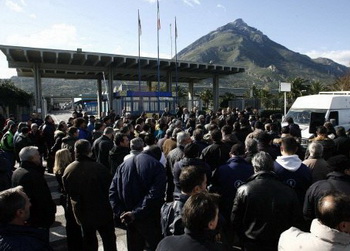 |
|
Striking
workers rally at the gates of Termini
Imerese in Sicily yesterday as the Fiat
Group was gripped by a nationwide walkout of
workers protesting at the planned closure of
the Sicilian factory. |
|
|
|
On Wednesday
Fiat was hit by a four-hour strike that halted vehicle
production across its six Italian factories as the
bitter fight to save the threatened Termini Imerese
plant in Sicily continues to ratchet up. The
increasingly bitter battle over the Sicilian factory’s
future sees Fiat Group CEO Sergio Marchionne and the
carmaker's senior management including Group Chairman
Luca di Montezemolo and Group Vice-Chairman John Elkann,
pitted up against national and regional government and
the firm's unions, while on Sunday no lesser authorities
figure than Pope Benedict XVI in a public address called
for the threatened jobs of workers at Termini Imerese to
be safeguarded.
Marchionne is
adamant the plant will be closed when production of the
current-generation Lancia Ypsilon runs out in less than a
year’s time. The smallest of Fiat’s Italian plants with
around 1,400 staff, it has no local supplier base meaning
components have to be shipped or flown onto the island
before the assembled cars are shipped back to the mainland,
adding, Fiat claims, an additional 1,000 euros per car to
the build price.
However Termini
Imerese is located in one of Italy’s worst unemployment
black spots and closing the plant, which indirectly employs
an additional 1,500 workers local, would cause much local
hardship. Unions are angry that Fiat, has chosen to break
away from its long tradition of social responsibility, a new
strategy outlined by Marchionne in a speech in Rome just
before Christmas, especially so as the carmaker is one of
the main beneficiaries of generous state subsidies. The
unions want the continuation of subsidies to be linked to
Termini Imerese's future. The pressure went up a notch
yesterday as Economy Minister Claudio Scajola was reported
by the AFP news agency as saying that the government
was "evaluating" stopping all incentives, including those in
the automotive sector which Fiat has said are vital to it
making a profit this year.
Last Friday
Scajola chaired the first meeting of a special taskforce set
up to look at the threatened plant's future, revealing that
seven expressions of interest had been received. That
government-chaired taskforce will meet again later today.
Scajola, who has been outspoken in his preference to see the
beleaguered plant remain within the Fiat Group, said
yesterday in response to the strike as it gripped Fiat's
production: "Fiat clearly needs to overhaul its plants;
however, the government believes there is is still room for
Termini Imerese plant."
CGIL trade union secretary Guglielmo Epifani said yesterday
that the Fiat's workers' four-hour strike "is going well".
Epifani also added that "in the days to come we will engage
in further talks," saying that in the immediate future
negotiating priorities would focus around Termini Imerese as
well as Alfa Romeo's Pomigliano d'Arco factory near Naples
that currently builds the Alfa 147, 159, 159 Sportwagon and
GT Coupé. "Termini Imerese should not be shut down. There is
no overcapacity in Italy," Gianni Rinaldini, the leader of
the powerful Fiom union told the Ansa news agency.
Fiat said yesterday that 14 percent of the workforce took
part in strike action while union sources said it involved
80 percent of workers at Termini Imerese and 50 to 70
percent at the Mirafiori plant in Turin.
As well as
Fiat's plan to close Termini Imerese, U.S. aluminium
producer Alcoa has hit the headlines as it intends to shut a
factory which is located on the southern coast of Sardinia.
This plant was also mentioned by the Pontiff last Sunday
alongside Termini Imerese in his address to the faithful.
Following Tuesday's government-chaired roundtable on Alcoa's
Italian operations, Scajola warned the US
Pennsylvania-headquartered firm yesterday that "they will
face due consequences should they opt to pursue with their
unwarranted course of action". Alcoa, he added, "is warned
that the government will not stand for any unilateral
decisions."
|